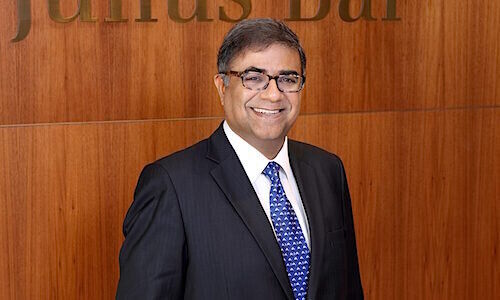As part of plans to boost discretionary assets, Julius Baer is ramping up efforts to promote the benefits of disciplined investing. The bank expects improved investment performance with little need for the smarts.
One of the distinct characteristics of Asia’s private banking industry is the tendency for its clients to be hands-on investors that aim for outsized gains via concentrated trades. This contrasts with the traditional approach of making steady returns through long-term, diversified portfolios that rely on delegation to experts.
«Going from one profitable trade to another is not realistic in the longer term,» said Julius Baer’s Asia chief investment officer Bhaskar Laxminarayan in a recent conversation with finews.asia.
DPM: 25 Percent by 2025
In line with the approach to delegate assets to experts in investment management, Julius Baer has set itself the objective of boosting the penetration of client assets globally in discretionary portfolio management (DPM) to 25 percent by 2025.
«We didn’t want to make marginal adjustments but make a bold step towards this goal,» noted Laxminarayan, who is also the region's head of investment management, on what he called an «ambitious target».
Psychology of Investing
According to Laxminarayan, there are known cognitive and emotional biases that affect decision-making for investors. For example, winning trades are often not repeated while losing trades can be held too long and result in prolonged exits from investing, all of which are well-established drivers of inferior performance.
«It’s like how they tell doctors they can’t operate on their own family. To some extent, it’s the same with managing money. When you make decisions on your own wealth, it can be unfavorable,» he described.
Core-Satellite Approach
But Julius Baer, like many other peers, is not advocating for the full abandonment of hands-on investing but, instead, suggesting to adopt a core-satellite approach. This means building a solid core portfolio using stable, diversified strategies with the majority of assets, accompanied by minority assets in high-conviction investments as satellites.
«With nearly three decades of private banking experience, it is becoming very clear that the core-satellite approach works well,» Laxminarayan said.
Asia: More Upside
And in Asia, Laxminarayan believes DPM is poised for faster growth due to a variety of reasons.
«The region is behind the curve in delegating investments. People have not adopted a mindset of structured investing. But with the next generation taking over the wealth, they feel much safer to delegate to a third party to invest than do it themselves, This is particularly true with Generation Z,» he said.
Family Offices
Even for family offices in Asia with more resources and sophisticated capabilities, there are lessons to be learned that can result in DPM demand. According to Laxminarayan, a common approach in the region is for family offices to delegate to a few managers for the ultimate purpose of replication.
«This is quite different from European family offices. We believe that the more effective approach is not to copy but to learn to manage relationships across multiple specialists,» he explained.
«Intelligence has very little to do with investment returns. Being disciplined and structured are the two most critical factors.»
DPM Outlook
2022 was a difficult year for investing and not unlike its competitors, Julius Baer’s business, including DPM, was affected by deleveraging and de-risking. But 2023 is expected to be better, particularly for fixed-income markets – traditionally a key area of focus for private banking clients – as yield normalizes from rising rates.
«Given the past year's market conditions, a significant part of the client wealth is in cash or cash equivalents like short-term deposits. There’s a lot to be unlocked from this cash allocation, especially for stable investment solutions like DPM,» Laxminarayan added.



























